The new 'Joker' is trans and fights fascist superheroes: "The US is an empire founded on racism and colonization."

Vera Drew is a woman, she is trans And she's the new Joker . Not Jack Nicholson, not Joaquin Phoenix , not Barry Keoghan. In The People's Joker, she's the one who puts on the wig (or wigs) and fights Batman. She's also the one who directs and writes this small queer film that, she admits to EL PAÍS, she never thought they'd see "more than five friends in a basement." And she's achieved it all without the approval of Warner Bros., the company that owns the Gotham universe, the fictional city where the stories of the superhero Batman take place. Her film is a parody, and its legality was always in question. Even a month before its release, when the company called again. "We made the film they would never make," she explains via video conference.
Drew (Chicago, 36 years old) discovered his transsexuality precisely by watching the beating Batman Forever (1995), by Joel Schumacher, to whom she dedicates her film . While others were fixated on the superhero, played by Val Kilmer, Drew, then six years old, discovered she wanted to be Nicole Kidman, one of its protagonists. That's one of the stories recalled in The People's Joker , which premieres on Filmin today after a legal odyssey. The film is a parody that takes place in a world of fascist superheroes. However, it is a highly personal film for the filmmaker: "Several people have told me that they went to see a silly Batman comedy, but that it moved them so much inside that they were finally ready to explore their genre."
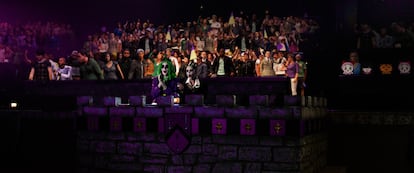
“To see The People's Joker, you need to have an open mind. It's not for everyone. But art doesn't always have to be. Part of the problem with mainstream films is that they try too hard to be mass-appealing. That's not art. And I think we all need to find our niche these days,” he explains.
Her Joker (a mix of a clown and his female counterpart, Harley Quinn) is an aspiring comedian in Gotham City struggling to figure out her gender identity. It's in a stand-up comedy club where she finds her tribe ( The Penguin , The Riddler, and the rest of the villains), fights against the fascism of a Batman who is revealed to be a sexual abuser, and plunges into a toxic relationship with a trans boy, inspired by Jared Leto's Joker (Suicide Squad, 2016).
This personal depth means that her “anarcho-leftist” comedy never comes across as cynical. It’s simply a reflection of her love for this universe and its characters: “No one should make a parody of something they don’t love, and I was obsessed with mythology, and those myths have to be public,” she says from a bedroom that emulates the dream room in David Lynch’s Twin Peaks series , with a herringbone floor and a large red curtain surrounding the unmade bed. “Laura Palmer [the protagonist of that series] appears to me every night,” she jokes.
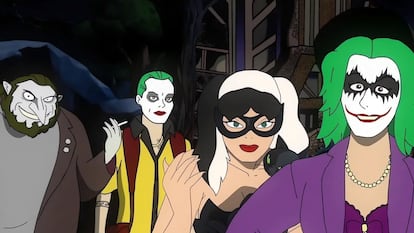
After the film's first screening at the 2022 Toronto International Film Festival, she received a letter from Warner Bros. prohibiting further screenings under threat of a legal rights lawsuit. The following year, a month before the general release in the United States, Warner Bros. retaliated, contacting her to ask her to change the title and make the theatrical release temporary. "I don't mind sharing it anymore. I'm at a point where I don't want to hide anything, and it can be helpful for others to make works like this. They were very worried about me stepping on the release of Joker 2 [in 2024], but I realized they were never going to sue me, so I didn't change anything. They just wanted to intimidate me," she says, confident of having secured international distribution.
Drew adopted her previous name as her last name, and that's another plot point of the film. Like her character, before her desired leap into directing, she had her place in the comedy world: she performed stand-up comedy and worked as an editor for comedians like Sacha Baron Cohen and the alternative comedy show Comedy Bang! Bang! That's why she knows what she's talking about when she says in the film that "you should never date a comedian," in a film that takes place in a world where humor is prohibited.
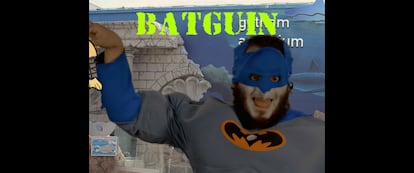
Her revolutionary revenge comedy even attacks America's most iconic comedy show, Saturday Night Live . "I know that pissed a lot of people off, but that's part of freedom of expression. The mainstream will always try to do something to keep these things from being seen. Having a film where I can do it all has empowered me, and I like that other artists are inspired to be transgressive."
Shot on chroma key and with sets made from models and toys, the very inexpensive film is an amalgam of references, and different animation and puppetry styles were used for its filming. The mother-daughter relationship is, for the director, the "foundation" of her work. "It's a love story between Joker and his mother, and their understanding. I think that's why it works. It's actually quite grounded; it's about finding your family as an adult, and perhaps reconnecting with your childhood and moving on," she explains about this mix, which also touches on culture wars, drugs to calm children, fake news, sexual abuse, and more.
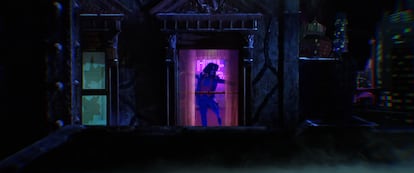
But where did such a crazy idea come from? Drew recalls that it was in 2020, when she saw some statements by Todd Phillips, director of Joker (2019), that infuriated her. He said, like so many others before him, that " woke culture doesn't let us be funny." The filmmaker set out to remake her film with a montage of farts, but in the process, she embraced her childhood love of Batman and the discovery of her transgender identity. That made her want to tell a self-fiction story that, yes, would laugh at everything. It also made her want to laugh at those who say you can't make humor, but, on the other hand, protest when the most conservative United States is questioned.
His message came at a time of need. “It sucks to go backwards on the rights we've gained , because we were already in trouble before. The 'we have too much diversity' argument is so wrong! These films are almost impossible to make; there still aren't the opportunities there are for cis-hetero men. To have a voice, I had to do something very garish, silly, colorful, unpleasant, and legally questionable,” he explains, although he acknowledges that in these times, it's easy to become prostrate and afraid: “The US has always been a fascist empire founded on racism and colonization. It's just now being revealed. We see how someone like Trump uses the advances of marginalized cultures to take us backward.”
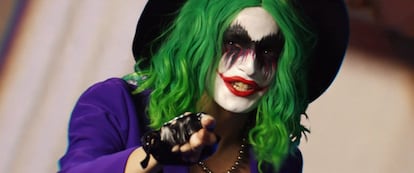
Despite his opposition and fear of seeing it, Drew curiously loved Joker 2 for its courage in breaking with what he had liked about the first one and for not wanting to please the audience: “I was excited, and I understood again why I liked superhero movies: because they were weird. I don't know if it's true, but I really think they modified some jokes for my movie, to avoid stepping on the toes in parodies.” He was so fascinated by it that he believes the Todd Phillips against whom his work was born would like The People's Joker : “We're smoking the same shit.”
EL PAÍS
